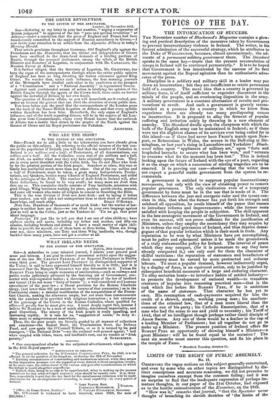THE GREEK REVOLUTION.
TO THE EDITOR OF THE SPECTATOR.
London, 3d November 1843.
SIR—Referring to my letter in your last number, "urging a suspension of British judgment" in approval of the late "pure and spotless revolution" at Athens,—under a conviction that the press of England and France had been treacherously committed to the support of Russian ascendancy in Greece,—I now invite your attention to an article from the Algenteine Zettung in today's Morning Herald. That article proclaims throughout Germany, Old England's ally against the Frenchman and the Muscovite, that the throne and independence of Greece have been sacrificed to the drum-head demands of a hireling partisan of Russia, through the personal incitement, among the rebels, of the British Minister and Secretary of Legation, in conjunction with Mr. CATACAZY, the Russian Envoy at Athens.
It is further alleged, that the Secretary of Legation, Mr. GRIFFITHS, has been the organ of the correspondents through whom the entire public opinion of England has been so long directing the foulest calumnies against King Onto. No wonder that, under such influence, the four morning journals of the Metropolis have rivalled each other in the exultation at the prospect of a " Constitution " and a " National Assembly" in regenerated Greece. Against such confederated unison of action in falsifying the opinion of the British Empire through the agents of the Crown itself, there exists no barrier against the downfall of Britain by her own hands.
The question of Eastern affairs, as you will henceforth see it evolved, pos- sesses an interest the gravest that can rivet the attention of every public man. You have before you the 'woof that the correspondents of the London press are the tools of the Russo-British Legation at Athens, and that every syllable written therefrom has been false. Henceforth, the only organ of England's influence, and of the truth regarding Greece, will be in the reports of the Lon- don press from Constantinople, where every Hamel knows that the outbreak at Athens was a double blow struck by the sceptre of the North against the thrones of OTHO and his Royal predecessor the Padishall.
ARISTIDES.


























 Previous page
Previous page